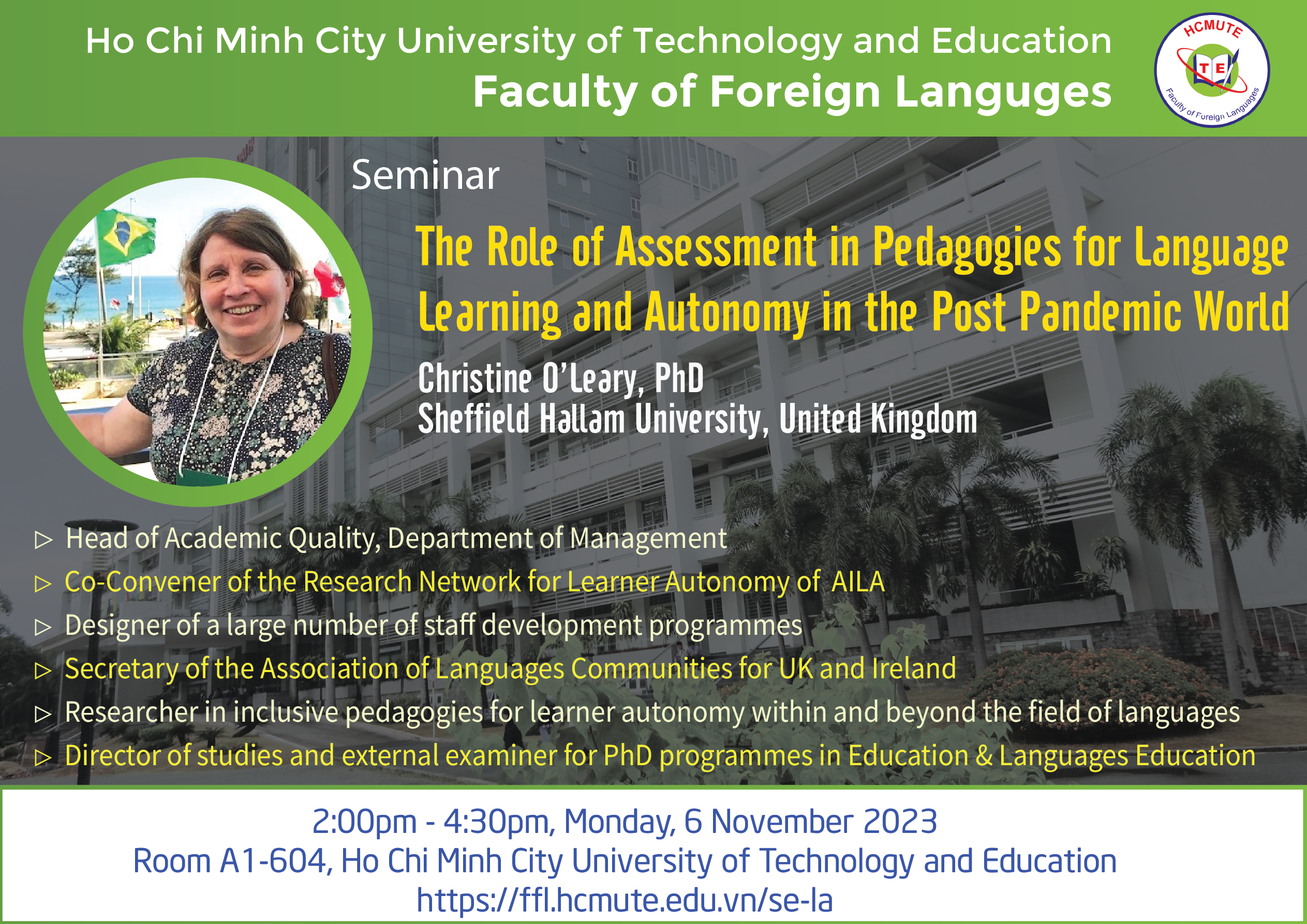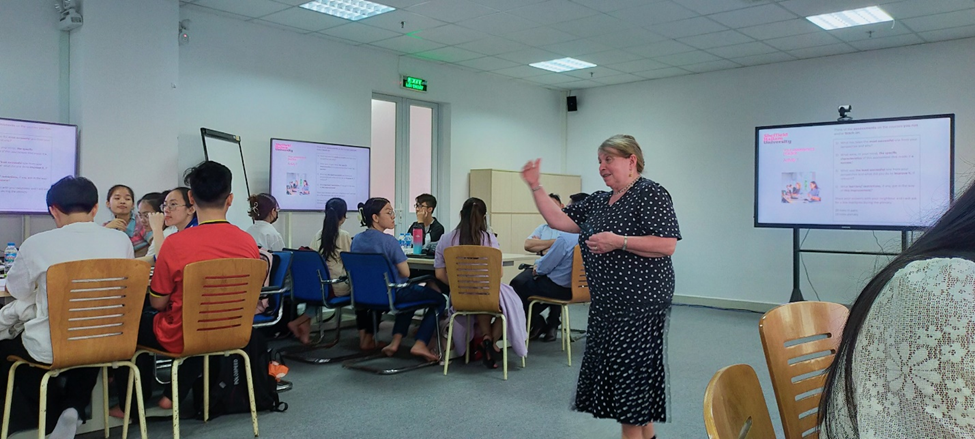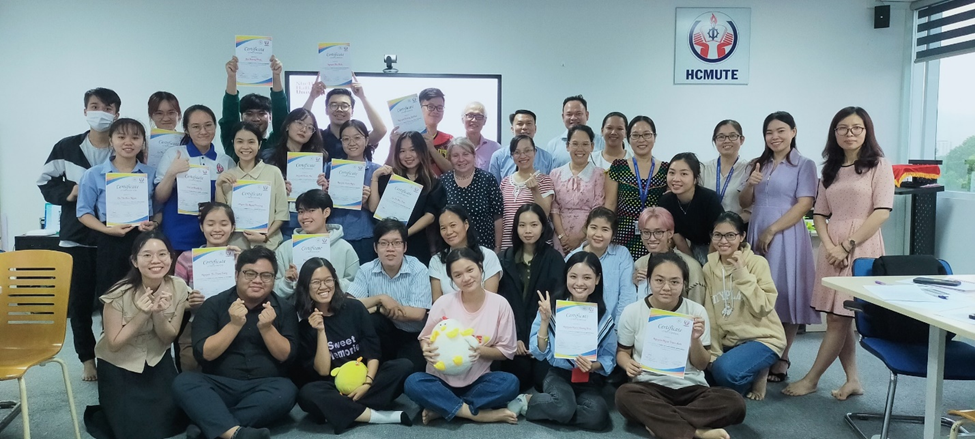The Role of Assessment in Pedagogies for Language Learning and Autonomy in the Post Pandemic World
Dr. Christine O’Leary, Sheffield Hallam University, United Kingdom
2:00pm - 4:30pm, Monday 6 Nov 2023
Room: A1-604, 1 Vo Van Ngan Street, Linh Chieu Ward, HCMC
Abstract
The recent pandemic has caused a step-change in the way many institutions approach teaching and learning (Pokhrel & Chhetri, 2021), with an opportunity to rethink traditional models and explore the affordances of digital technologies in Higher Education Pedagogy (Navarro Cira & Carillo López, 2020), including more agentic assessment with the opportunity for choice and a multimodal approach (Silseth and Gilje, 2017). The recent growth in generative artificial intelligence software such as ChatGBT has further challenged traditional methods of assessment, such as essays or questions of a more general nature (Moqbel & Al-Kadi, 2023). Within a social context, the concept of learner autonomy, usually defined as students’ ability and willingness to take charge of their own learning independently and interdependently (Benson, 2011), has close association with the concept of learner agency, defined by Ahearn (2001) as a socioculturally mediated capacity to act, and Freire’s (1972) political transformation-oriented concept of empowerment (see Gao & Zhang, 2011; Nicolaides, 2017). Assessment can play a key role in fostering effective learning (Sadler, 2010; Stobart, 2023), the development of learner autonomy and emotional intelligence to promote learners’ well-being and resilience (O’Leary, 2014, 2018). This presentation will explore the benefits of developing assessment which promote student agency and autonomy within a student-centred higher education languages curriculum.
References
Ahearn, L. M. (2001). Language and agency. Annual Review of Anthropology, 30(1), 109-137.
Benson, P. (2011). Teaching and Researching Autonomy in Language Learning (2nd ed). Longman.
Freire, P. (1972). Pedagogy of the Oppressed. Penguin Books.
Gao, X. & Zhang, L. J. (2011). Joining forces for synergy: Agency and metacognition as interrelated theoretical perspectives on learner autonomy. In G. Murray, X. Gao, & T. Lamb (Eds.), Identity, Motivation and Autonomy in Language Learning (pp. 25-41). Multilingual Matters.
Navarro Cira, B. E., & Carillo López, I. (2020). COVID-19, a breakthrough in educational systems: Keeping the development of language learners’ autonomy at Self-Access Language Centres. Studies in Self-Access Learning Journal, 11(3), 220–234. https://doi.org/10.37237/110309
Nicolaides, C. (2017). Agency and empowerment towards the pursuit of sociocultural autonomy in language learning. In C. Nicolaides & W. Magno e Silva (Eds), Innovations and Challenges in Applied Linguistics and Learner Autonomy (pp.19-41). Pontes Editores.
O'Leary, C. T. C. (2014). Developing autonomous language learners in higher education: A social constructivist perspective. In G. Murray (Ed.), Social Dimensions of Autonomy in Language Learning (pp. 15-36). Palgrave Macmillan.
O'Leary, C. (2018). Exploring the development of learner autonomy from a postmodern and social constructivist perspective: Prioritising voices. The Learner Development Journal, 2.
Raes, A., Detienne, L., Windey, I. et al. (2020). A systematic literature review on synchronous hybrid learning: Gaps identified. Learning Environment Research, 23, 269–290. https://doi.org/10.1007/s10984-019-09303-z.
Sadler, R. D. (2010). Beyond feedback: Developing student capability in complex appraisal. Assessment and Evaluation in Higher Education, 35(5), 535-550.
Silseth, K. & Gilje, O. (2019). Multimodal composition and assessment: A sociocultural perspective. Assessment in Education: Principles, Policy and Practice, 26(1), 26-42. https://doi.org/10.1080/0969594X.2017.1297292.
Stobart, G. (2023). Alternative assessment. In R. J Tierney; F. Rizvi & K. Ercikan (Eds.), International Encyclopedia of Education (4th ed.) (pp. 96-102). Elsevier. https://doi.org/10.1016/B978-0-12-818630-5.09018-7.
Moqbel, M. S. & Al-Kadi, A. (2023). Foreign language learning assessment in the age of ChatGPT: A theoretical account. Journal of English Studies in Arabia Felix, 2(1), 71–84. https://doi.org/10.56540/jesaf.v2i1.62.
Biography
Dr Christine O’Leary is a Principal Lecturer at Sheffield Hallam University, in the UK, where she has held a number of leadership roles, including Head of Languages and Cultures and Assessment lead for her Faculty. She co-leads the Research Network for Learner Autonomy of the International Association of Applied Linguistics (AILA) and is Secretary of the Association of Languages Communities for UK & Ireland. She has a wide-ranging experience in designing and leading programmes of study, in Languages and Research Methods. She is an experienced doctoral director of studies and external examiner for PhD programmes in Education and Languages Education. She has designed and led a large number of staff development programmes both within her institution and externally. Her research interests focus on inclusive pedagogies for learner autonomy within and beyond the field of languages, and research- informed assessment practices. She has presented and published widely in these areas in the last 25 years.
Registration: Online at here.

On November 6, 2023, the seminar attracted over 50 educators and students from Ho Chi Minh City University of Technology and Education (HCMUTE) and nearby institutions. The event became a focal point for engaging discussions and collaboration among the participants. The discussion was centralized on maintaining and enhancing learner autonomy and agency through various assessment methods.

In her presentation, Dr. Christine explored the latest trends in language education after the COVID-19 Pandemic. She highlighted the opportunities and challenges presented by artificial intelligence, including ChatGPT. Both lecturers and students actively engaged in listening, exchanging ideas, and sharing perspectives on this intriguing topic.

The seminar facilitated meaningful interactions as students from HCMUTE actively participated, interacted with Dr. Christine O’Leary, and gained insights into the evolving landscape of language education.

As the event concluded, certificates were awarded, marking the success of the dynamic and insightful program.

In an era of transformative changes in education, the seminar not only shed light on current trends but also fostered a collaborative environment for educators and students. The exchange of ideas is poised to influence ongoing discussions on learner autonomy and assessment methodologies in language education.
- 711 views




























